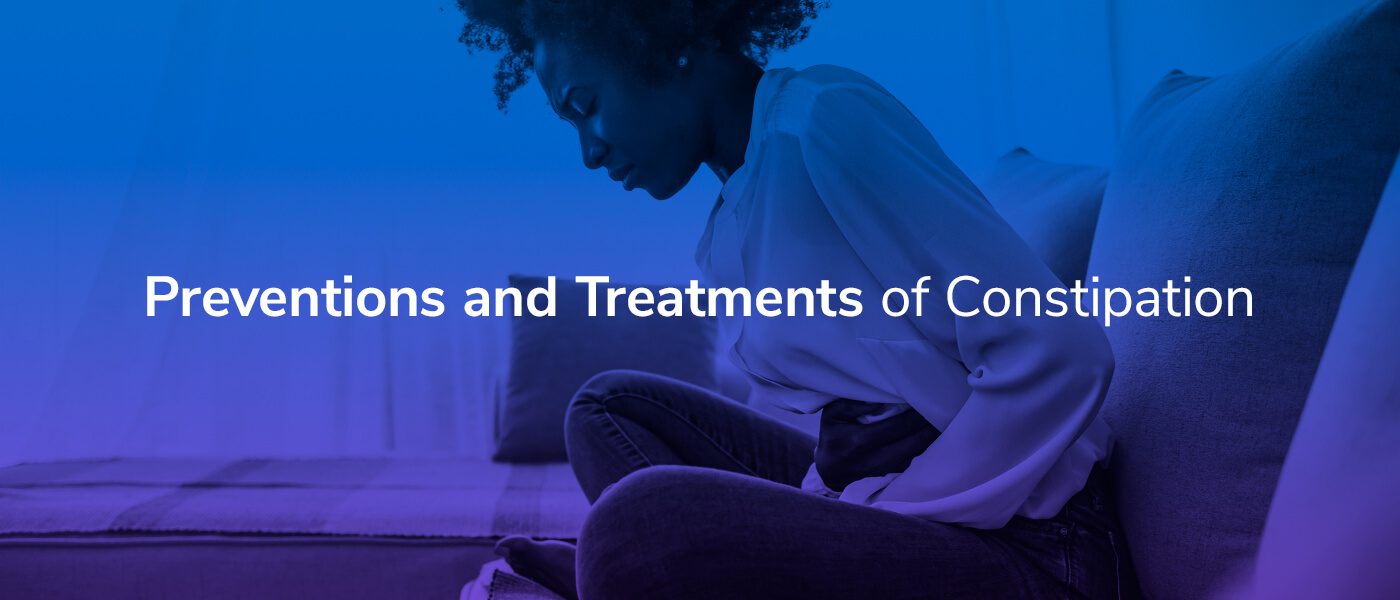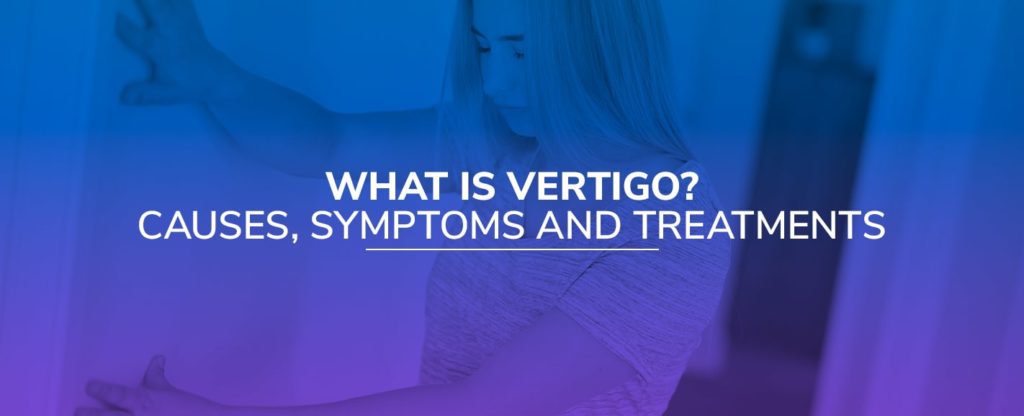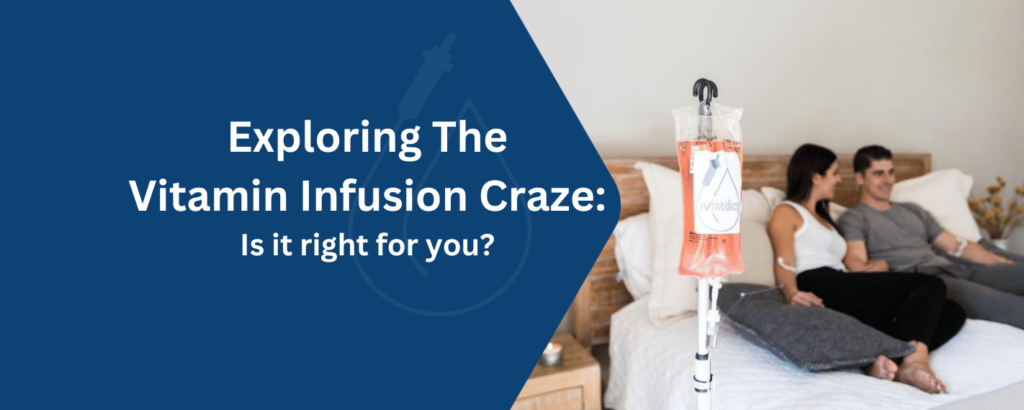Constipation is a very common medical issue that occurs when you have difficulty with the routine function of emptying the bowels. The good news is that constipation usually resolves within a few days. Chronic constipation lasting for several weeks is cause for seeing a doctor.
Jump Ahead:
- The Symptoms of Constipation
- Constipation Risk Factors
- Complications of Constipation
- How to Prevent Constipation
- How to Treat Constipation
- When to Seek Medical Attention
- Frequently Asked Questions
- IV Drips to Prevent or Treat Constipation
You should always speak to a medical professional about a health problem that might concern you. Learning more about this issue can be helpful but should never substitute a medical consultation.
The Symptoms of Constipation
Constipation happens when your colon absorbs too much water from fecal matter as it passes into the rectum. Hard lumpy stools that are difficult to pass and break easily into pellets are the primary manifestation of this condition. Symptoms of constipation can vary between patients depending on the severity. Here are some of the most common symptoms:
- Bloating
- Cramping
- Lethargy
- A decreased appetite
- Having fewer than three bowel movements each week
- Needing to strain or push on your lower abdomen to force the stool out
- Feeling a blockage of stool in the rectum
- Feeling like you are unable to fully empty your bowels
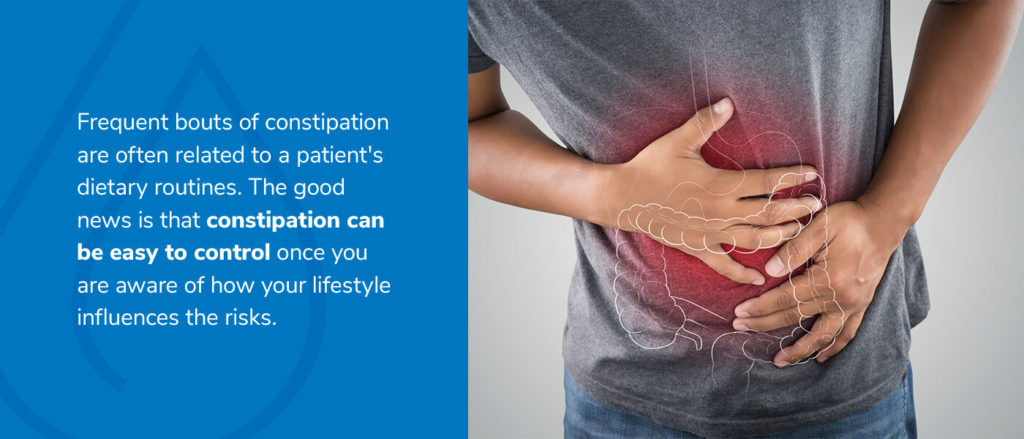
Constipation Risk Factors
Frequent bouts of constipation are often related to a patient’s dietary routines. Many people who get constipated often have low awareness of what causes this condition to progress. The good news is that constipation can be easy to control once you are aware of how your lifestyle influences the risks. Some of the most common lifestyle risk factors include:
- Dehydration at night
- Dehydration during the day
- Drinking too little water
- A diet low in fiber and high in sugars and fats
- Eating a large amount of cheese or other dairy products
- Frequent exposure to a stressful environment
- Skipping meals or eating too little food
- Getting a poor or irregular amount of exercise
- Sudden changes in your sleeping habits or too little sleep
- Holding your stool for prolonged periods
Other risk factors are hereditary or have causes that you might be unable to control. These demographic risk factors include:
- Hormone imbalances: Your endocrine system plays a role in regulating your digestive system, and hormone distribution irregularities can cause problems with digestion and bowel movements.
- Old age: As you age, your metabolism slows down, and your risk of constipation increases.
- Medications: Certain medications list constipation as a side effect. If your medication seems to be causing severe bouts of constipation, ask your doctor if you can switch.
- Pregnancy: Sometimes hormonal changes during pregnancy can lead to constipation, or you can experience constipation shortly after giving birth.
- Neurological disorders: Some neurological disorders result in constipation, especially those where the autonomic nervous system behaves irregularly. Patients with neurological trauma caused by a spinal cord injury, stroke, multiple sclerosis or Parkinson’s disease all might struggle with constipation.
- Digestive disorders: Many disorders of the digestive tract can create gut conditions that favor chronic constipation. One of the most common is irritable bowel syndrome (IBS).
- Structural defects of the digestive tract: When your internal structure is atypical, your ability to pass stool could be affected. Examples of structural problems include imperforate anus, fistula and colonic atresia.
- Autism: The link between constipation and autism is currently under investigation, but some researchers believe that autism can create abnormalities in gut microbes.
Complications of Constipation
Chronic constipation can lead to health consequences such as:
- Hemorrhoids: These are inflamed veins around the rectum from straining.
- Anal fissures: These are tears in the delicate lining of your anal canal.
- Fecal impaction: When this happens, stool that has accumulated in the rectum is blocked from coming down.
- Diverticulitis: This condition is caused when fecal impaction forms pouches in the colon wall and becomes infected.
- Urinary incontinence: This occurs when you strain to release stool, and your pelvic floor muscles are damaged in the process. Your pelvic floor muscles control the bladder.
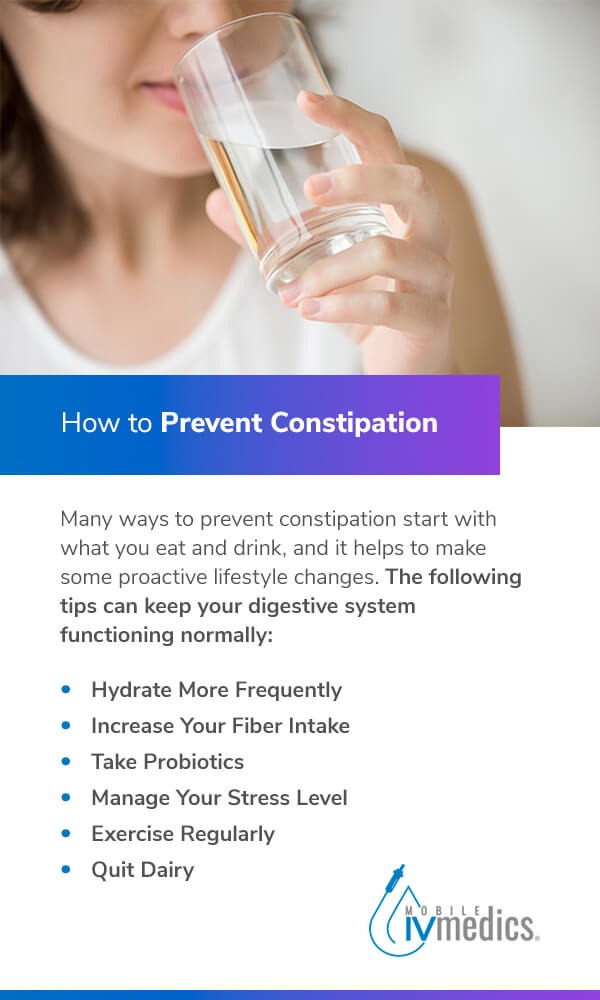
How to Prevent Constipation
Many ways to prevent constipation start with what you eat and drink, and it helps to make some proactive lifestyle changes. Despite your best efforts, mild constipation may occur occasionally even when you make healthy choices. The following tips can keep your digestive system functioning normally:
Hydrate More Frequently
Drink between 11.5 and 15.5 cups of water each day to ensure that you stay well hydrated. Drinking enough water helps keep your stool soft enough to pass through the rectum uninterrupted. Increasing your intake of liquids could help relieve your constipation if you are already experiencing symptoms.
Some liquids are unlikely to help your constipation, however, and a few might contribute to the issue or worsen your constipation. Avoid these drinks if you are struggling with constipation:
- Dairy
- Soda
- Sweet tea
- Sugary soft drinks
- Alcoholic beverages
- Caffeinated beverages
The best liquids for treating constipation put moisture back in your stool, contain fiber or have other qualities that stimulate your digestion. Consume these drinks to help prevent dehydration or treat constipation:
- Water
- Orange juice
- Low sugar apple juice
- Prune juice
Increase Your Fiber Intake
Fiber comes in a soluble and insoluble form, and both are good for your digestive health. Insoluble fiber adds texture to your stool, helping it pass more easily through the intestines, colon and rectum. Soluble fiber makes the stool healthier and softer when paired with a good amount of hydration.
Fiber has many benefits. It can help relieve constipation while also lowering your LDL cholesterol. Fiber is also associated with a reduced risk of colon cancer. Some evidence suggests fiber can also help regulate your blood sugar.
Foods that are high in fiber for healthy stool:
- Whole-grain breads, pastas and cereals
- Fruits such as apples, bananas and oranges
- Vegetables, especially carrots and broccoli
- Legumes such as lentils, split peas and pinto beans
- Nuts such as almonds, pecans, peanuts and pistachios
Check the sugar content of a product that contains the above ingredients before you consume it for constipation. Eating a package of mixed nuts would be better for absorbing some fiber than eating a piece of pecan pie, which is also high in calories.
Take Probiotics
Probiotics are helpful bacteria that can benefit your digestive tract and are available over the counter in pill form. Your gut requires a diverse and flourishing community of microbes to function properly. If constipation is a frequent issue, starting a regimen of probiotics could help. Some studies indicate that probiotics containing bifidobacterium can support an increase in bowel movements.
Manage Your Stress Level
Being under stress contributes to many negative health consequences. Stress makes digestion more difficult because it causes your body to stay stuck in sympathetic mode. The parasympathetic nervous system is what helps you digest your food and defecate, whereas the sympathetic nervous system regulates fight-or-flight responses. If you have experienced regular constipation recently, consider your stress level and try to find more time for relaxation in your schedule.
When you’re stressed out, you might tend to ignore your need to hydrate and eat regular meals, which can make constipation worse.
Exercise Regularly
Getting enough exercise is vital for regulating your digestive system. People who exercise need to hydrate more frequently, which also helps prevent constipation. Building up your internal abdominal muscles could help with digestion, although the muscles that line the internal organs are unaffected by weight-lifting.
Quit Dairy
Numerous studies show a correlation between the consumption of dairy products and constipation. If you are intolerant to dairy, you might experience more extensive bowel issues from consuming these products. Still, people who struggle with constipation may find relief if they quit dairy regardless of their tolerance.
Dairy can be found in many food items. If you want to go on a dairy cleanse, carefully check the labels of these products and shop for alternatives:
- Butter
- Yogurt
- Cheese
- Chocolate
- Candies
- Popcorn
- Pizza
- Coffee creamer
- Cream cheese
- Whipped cream
- Condensed soup
- Heavy cream, table cream or whipping cream
A diet high in fats can also make constipation worse, and many of the above foods contain milk fat.
How to Treat Constipation
When you’re constipated, consuming water, prune juice and apple slices may help, but what are other ways you can treat the problem? Here are some home constipation remedies you can try:
Take Laxatives
You can get laxatives for relieving constipation over the counter. There are several options, and most are marketed for treating constipation specifically. Laxatives fall into the following categories:
- Stool softeners: They function to put moisture into your stool to help you pass it more smoothly.
- Stimulants: They are designed to stimulate your intestines by producing contractions.
- Osmotics: They increase the intestinal fluids in your bowels.
- Lubricants: They lubricate the intestines to help you pass hard stool.
A single laxative might have multiple functions, so if you’re looking for a specific type — or if you want to avoid a particular type — it’s best to read the label. Overusing laxatives might make your symptoms worse. Use only the recommended amount, and seek medical care if the laxative fails to work or if you experience new symptoms.
Get an Enema
An enema is another way to put fluids back into the stool, but it works by directly rehydrating the rectum. Out of all constipation treatments, this method is perhaps the most efficient at quickly clearing out blockages except for a more invasive surgery. Enema kits are available over the counter, or a doctor or another qualified medical professional can administer the enema using water with a solution that may contain sodium phosphate. This procedure can be done in a medical office setting, depending on your location.
An enema is a last resort treatment and is usually attempted after other methods of relieving constipation have failed. If you have an enema, it’s important to drink fluids after your procedure.
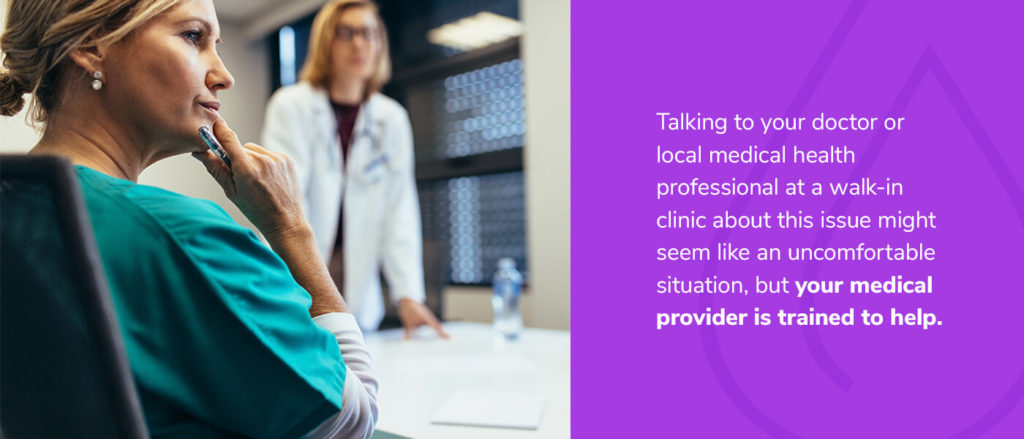
When to Seek Medical Attention
Constipation is usually self-treatable at home without medical intervention. Talking to your doctor or local medical health professional at a walk-in clinic about this issue might seem like an uncomfortable situation, but your medical provider is trained to help. A doctor might be able to resolve the issue more effectively and quickly than you could on your own.
Rarely, constipation can be serious. Your doctor evaluates your risk factors and gets your estimated history of the problem. Collecting information ensures that they take the best possible course of action for your treatment plan. If you experience the following symptoms along with your constipation, seek medical attention immediately:
- Fever
- Blood in the stool
- Severe abdominal cramps
- Unexpected weight loss
- Constipation lasting for more than one week
- Constipation that persists after use of laxatives
These symptoms could be a sign of a more serious health condition. Your doctor can help by:
- Prescribing medications for treating constipation
- Providing an enema
- Performing surgery to reduce or remove stool blockages
- Performing surgery to excise parts of the colon
Surgery for constipation is rare. Your doctor is more likely to suggest surgery as a solution if your constipation is related to a structural issue or another underlying health condition. If your constipation cannot be managed at home, your doctor is likely to prescribe medication and tell you to avoid certain foods and beverages.
Frequently Asked Questions
Do you have more questions about constipation? Keep reading for a brief Q&A:
What Kinds of Questions Would a Doctor Ask About My Constipation?
Your medical service provider might ask how long you have had the issue and about your family history. They collect your medical history to investigate, and they might also ask if you are pregnant, have recently gained or lost weight, saw any blood in your stool or have any other symptoms.
Does Coffee Treat Constipation?
Although some studies show that drinking coffee can assist with bowel movements, other studies indicate that caffeine causes dehydration, which can make constipation worse. Either way, drinking black coffee when you are constipated is preferable to drinking coffee with milk or creamer added, as dairy makes this issue worse for some people.
How Do I Know if My Diet Is Causing Constipation?
Keep a food journal or log. Check how much fiber you get in your diet after about a week. You should also note how many ounces of fluids you drink and what kind of beverages you consumed. If it seems like your diet is high in processed foods, caffeine, dairy, fatty cuts of meat and sugary sweets, then your problem could be linked to your diet.
What Prescription Medications Are There for Constipation?
Which medication could offer the most relief depends on the cause of your constipation, your other medicines, your family history and additional factors. Allow your provider to determine the best treatment plan. A doctor may prescribe one of the following:
- Lubiprostone (Amitiza®)
- Prucalopride (Prudac® or Motegrity®)
- Plecanatide (Trulance®)
- Lactulose (Cephulac® or Kristalose®)
- Linaclotide (Linzess®)
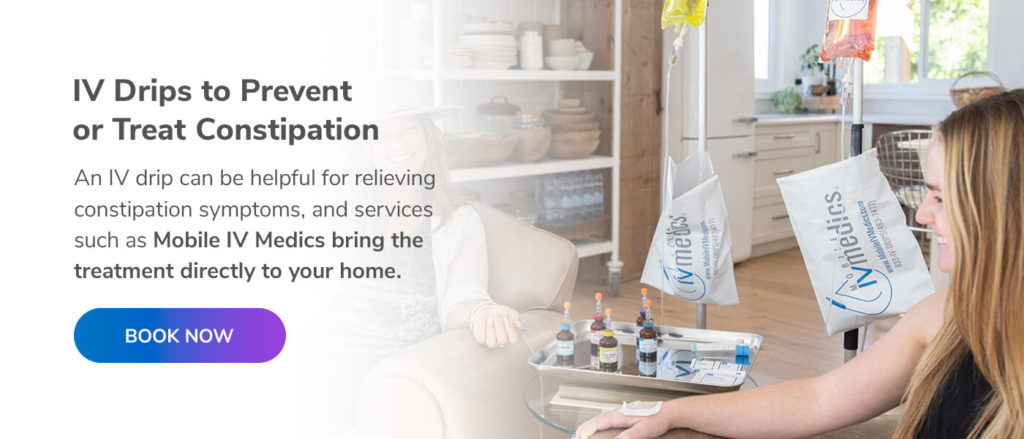
IV Drips to Prevent or Treat Constipation
An IV drip can be helpful for relieving constipation symptoms, and services such as Mobile IV Medics bring the treatment directly to your home. An IV line makes rehydrating an easy, restful process for patients who feel lethargic and lack appetites. The IV drip puts fluids and any requested supplements or medications from our list into your bloodstream.
Try our hydration package as an IV therapy for constipation, and choose from various add-ins. Interested in treating your constipation at home? Contact us to learn more about our services.
Sources:
- https://www.aafp.org/pubs/afp/issues/2005/1201/p2277.html
- https://pubmed.ncbi.nlm.nih.gov/22847198/
- https://www.frontiersin.org/articles/10.3389/fnins.2020.578666/full#:~:text=There%20is%20increasing%20evidence%20suggesting,alterations%20of%20the%20gut%20microbiota.
- https://www.mayoclinic.org/healthy-lifestyle/nutrition-and-healthy-eating/in-depth/water/art-20044256#:~:text=The%20U.S.%20National%20Academies%20of,fluids%20a%20day%20for%20women
- https://www.ncbi.nlm.nih.gov/pmc/articles/PMC4588743/
- https://www.webmd.com/diabetes/understanding-carbohydrates-fiber#:~:text=Fiber%20helps%20control%20blood%20sugar,needed%20on%20a%20daily%20basis.
- https://www.health.harvard.edu/blog/probiotics-may-ease-constipation-201408217377#:~:text=By%20pooling%20the%20findings%20of,to%20be%20the%20most%20effective.
- https://journals.sagepub.com/doi/10.1177/02601060211004784
- https://medlineplus.gov/druginfo/meds/a614018.html
- https://www.medicalnewstoday.com/articles/326537
